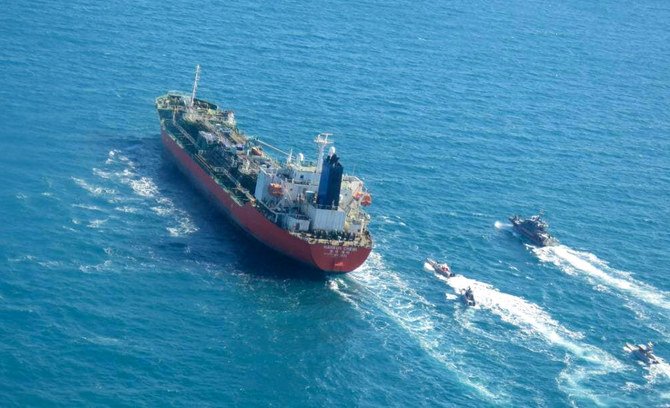
- ARAB NEWS
- 03 May 2024

Christopher Hamill-Stewart
LONDON: A South Korean-flagged chemical tanker has been detained in the Strait of Hormuz by Iranian forces, the latest in a string of maritime incidents raising tensions in one of the world’s most important shipping lanes.
According to Dryad Global, a maritime security monitoring and advisory firm, the South Korean ship Hankuk Chemi “diverted from her course northwards into Iranian territorial waters while inbound to Fujairah (in the UAE) from (the Saudi city of) Al Jubail.”
Dryad Global said the vessel, which has a crew of 23 Indonesian and Burmese nationals, “has been detained by Iranian forces.” This was later confirmed by Iranian state media.
Relations between Tehran and Seoul, an ally of the US, have deteriorated in recent years, in part because of a dispute over Iranian oil money allegedly frozen in South Korean banks.
Munro Anderson, a partner at Dryad Global, told Arab News that the maritime incident is indicative of wider Iranian regional strategy and foreign policy.
“The vessel was detained for what Iran describes as oil pollution, which is complete nonsense,” he said, adding that the ship’s detention is undoubtedly linked to the feud over the frozen oil money.
Incidents such as this indicate “that Iran will seek to leverage all sorts of attributable and non-attributable actions against those who it perceives to be working against its interests,” he said.
Anderson added that broadly speaking, shipping safety in the region is not in decline, but that ships and sailors from states involved in disputes with Iran are at heightened risk of being targeted as part of Tehran’s strategy in the Arabian Gulf.
The detention of ships “is a classic Iranian and IRGC (Islamic Revolutionary Guard Corps) playbook activity, and it shows that Iran has the capacity and the intent to exercise its influence within the region to achieve its wider foreign policy goals,” he said.
Anderson added that this incident is the latest in a string of actions attributable to Iran, including the recent discovery of limpet mines on two ships in the Arabian Gulf and off the coast of Iraq. The Iranians “have shown that this is how they operate,” he said.
“Iran will continue to use all sorts of unconventional and unscrupulous means to further its foreign policy agenda,” and the Arabian Gulf “is a natural area for it to do this,” he added.